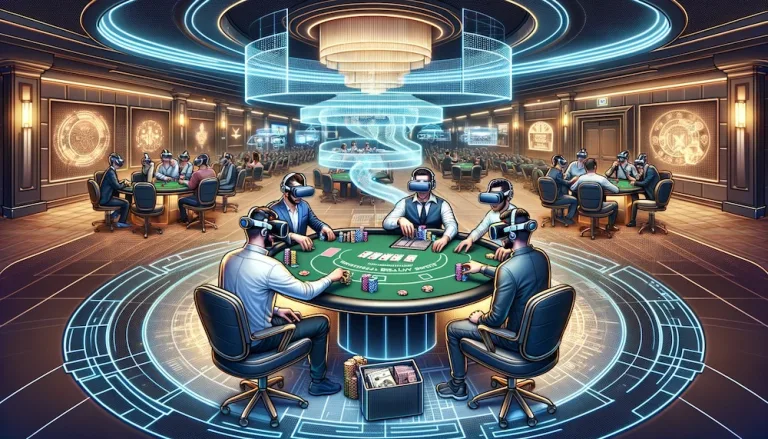Virtual reality (VR) technology is revolutionizing the poker landscape by creating immersive and interactive gaming experiences that replicate the thrill of live poker. By leveraging VR, players can engage in realistic poker games from the comfort of their homes, interacting with other players in a virtual environment. This article explores the impact of virtual reality on poker, its benefits, challenges, and future potential.
The Emergence of Virtual Reality Poker
From Traditional to Virtual
Traditional online poker has been a staple in the gambling industry for years, providing convenience and accessibility. However, it often lacks the social interaction and excitement of live poker games. VR poker bridges this gap by offering a more engaging and realistic experience, combining the best of both worlds.
How VR Poker Works
In VR poker, players use VR headsets to enter a virtual casino environment. They can see a virtual poker table, interact with other players through avatars, and use hand gestures to play the game. The immersive nature of VR makes players feel as though they are sitting at a real poker table, enhancing the overall gaming experience.
Benefits of Virtual Reality Poker
Immersive Experience
The primary benefit of VR poker is the immersive experience it offers. Players can engage in realistic poker games, complete with detailed graphics and lifelike interactions. The sense of presence in a virtual environment makes the game more exciting and engaging, replicating the atmosphere of a live poker room.
Social Interaction
VR poker enhances social interaction by allowing players to see and communicate with each other in real-time. This interaction adds a social dimension to online poker, making it more enjoyable and fostering a sense of community. Players can use voice chat, gestures, and expressions to communicate, creating a more authentic poker experience.
Improved Skills and Strategy
The realistic nature of VR poker allows players to practice and improve their skills in a lifelike setting. Players can observe opponents’ behaviors, make strategic decisions, and develop their poker skills in a more effective way. The ability to read virtual tells and interact with other players enhances the strategic aspect of the game.
Challenges of Virtual Reality Poker
Technological Requirements
One of the main challenges of VR poker is the need for advanced technology. Players require VR headsets and compatible devices to access VR poker games. The cost and technical requirements can be a barrier for some players, limiting the accessibility of VR poker.
Learning Curve
VR poker introduces a new way of playing the game, which may require a learning curve for some players. Getting accustomed to the VR environment, using hand gestures, and navigating the virtual space can be challenging initially. Providing tutorials and support can help players adapt to the new format.
Connectivity and Performance
Ensuring a smooth and seamless VR poker experience requires robust internet connectivity and high-performance hardware. Any lag or technical issues can disrupt the gaming experience and frustrate players. Operators must invest in reliable infrastructure to provide a consistent and enjoyable experience.
Future Prospects of Virtual Reality Poker
Technological Advancements
The future of VR poker looks promising, with continuous advancements in VR technology expected to enhance the gaming experience further. Improvements in graphics, processing power, and VR headsets will make VR poker more accessible and enjoyable for a wider audience.
Integration with Other Technologies
The integration of VR with other emerging technologies, such as artificial intelligence (AI) and blockchain, could revolutionize VR poker. AI can enhance the interactivity and personalization of VR poker games, while blockchain can ensure transparent and secure transactions. These integrations will create more innovative and secure gaming environments.
Expanding Game Selection
As VR technology evolves, the selection of VR poker games is likely to expand. Developers will continue to innovate, creating new game formats, features, and environments that cater to different player preferences. The diversity of VR poker games will attract a broader audience and keep players engaged.
Conclusion
Virtual reality is transforming the poker landscape by offering immersive and interactive gaming experiences that replicate the thrill of live poker. While there are challenges to overcome, the benefits of VR poker are significant, providing a more engaging and realistic way to play the game. As technology continues to advance, the future of VR poker looks bright, promising exciting developments that will further enhance the player experience. Whether you’re a seasoned poker player or new to the game, virtual reality poker offers a thrilling and innovative way to enjoy this classic card game.

Garry Sputnim is a seasoned journalist and storyteller with over a decade of experience in the trenches of global news. With a keen eye for uncovering stories that resonate, Alex has reported from over 30 countries, bringing light to untold narratives and the human faces behind the headlines. Specializing in investigative journalism, Garry has a knack for technology and social justice issues, weaving compelling narratives that bridge tech and humanity. Outside the newsroom, Garry is an avid rock climber and podcast host, exploring stories of resilience and innovation.


